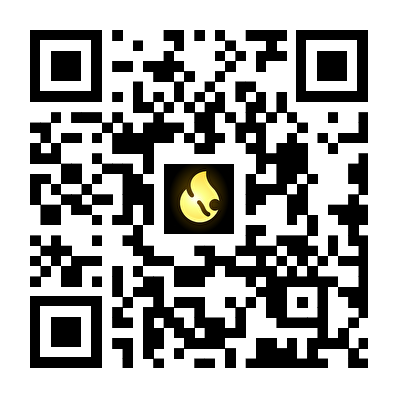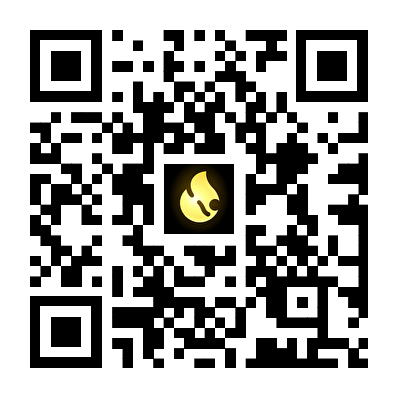Keeping track of your food consumption is a straightforward process, but it takes time. The fact that people underestimate the presence of hidden calories and misunderstand nutrition labels makes the progress agonizingly slow. Food Diary apps are the solution to this issue because they will help you be accountable and see the big picture by logging all your meals in one place.
The right food diary app offers precise information about calorie consumption, macronutrients, and diet. This article provides the best apps to monitor your food that exist today, so you can choose the one that suits your lifestyle.
In this article
Part 1. What Is a Food Diary App and How Does It Work?
A Food Diary app is a mobile toolkit that helps users log daily meals, keep a record of foods, and get detailed insights into meal analysis. The best food diary app is one that allows logging by text or photos, along with timestamps, to reveal patterns such as skipped meals or late-night snacking. It includes a database consisting of prerecorded meals with their macronutrient breakdown, offering nutritional insights quickly.
How Does it Work?
Before understanding how this app can improve our lifestyle habits, let's see how it works to track your meals and maintain a proper record.
- Logging: Add meals with manual text entry, photo snapshots, and barcode scanning with timestamps and meal type.
- Context: Capture hunger, mood, symptoms, water, sleep, and activity levels to see how routines influence choices.
- Reminders: Gently remind of skipped meals and water intake to support healthier daily habits.
- Insights: Daily grids and trend views show progress, and some include notes or reflection prompts.
- Sharing: Many apps allow users to share meal reports with a coach, clinician, or accountability partner.
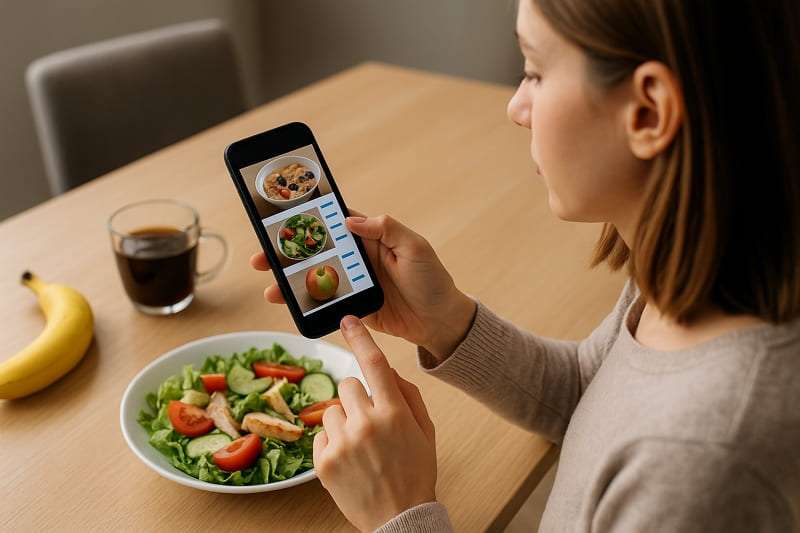

Part 2. 5 Benefits of Using a Food Diary App Daily
Upon learning how food diary apps work, it's important to understand how these apps can help you reach your fitness goals. Therefore, we'll highlight five main benefits of using a food diary app, whether a free or paid option.
- Eating Habits Awareness: Document everyday meals that assist you in discovering eating patterns and enhancing health measures. It gives you an insight into what you are eating, what you ate before, and what you are used to consuming.
- Food Portion Control: This is a recommendation of the food portion that you should consume to keep your diet in check. It aids you in avoiding eating more or less and controlling the amount of food in every meal and snack.
- Informed Choices: These applications monitor your health objectives and propose superior meals and habits. This allows users to make more informed decisions about food items to prioritize and set goals more easily.
- Nutrient Tracking: Food diary apps display calories, proteins, fats, and carbs, showing whether your diet is truly balanced. Nutrient analysis allows you to monitor intake and adjust meals according to personal fitness and health goals.
- Motivation: Reminders and progress trackers help maintain daily consistency, keeping your health journey on track. Celebrating small milestones builds motivation, creating accountability that supports lasting lifestyle changes and healthier habits.
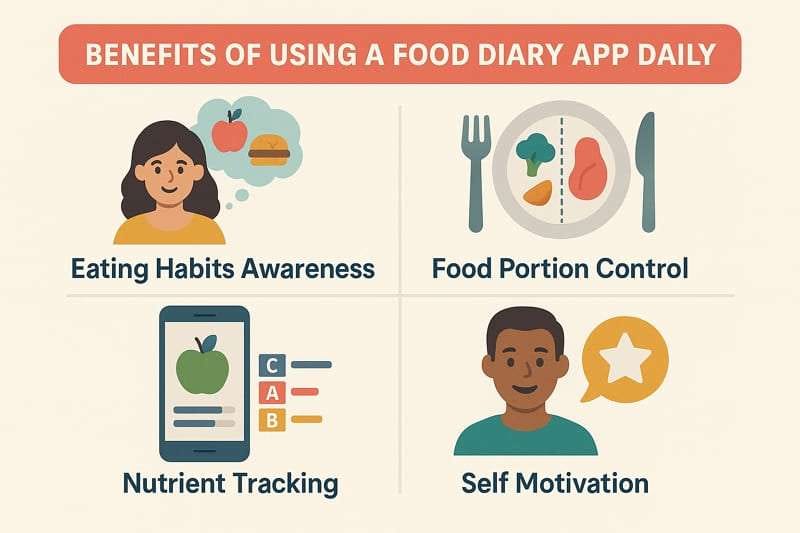
Part 3. 5 Key Features to Look for in a Food Diary App
Regardless of whether you want to lose, gain, or maintain weight, the best food diary app can help you achieve your desired outcome, depending on its features. In such a way, this section describes five important features that you must consider before registering:
- Personalized Advice: These applications should monitor your daily dietary habits and lifestyle and give you a personalized recommendation. It simplifies your task of making the most suitable food choices and making amendments to your daily routine.
- Photo Meal Logging: Such apps should allow users to log their meals using real-time pictures. This will enable users to add meal items in a short time without the additional inconvenience of manually adding items.
- Nutritional Analysis: Once you enter what you are eating, these apps should provide a breakdown of the protein, carbs, and fat content in food. It allows users to create their daily meal plan with protein and low-carb foods.
- Progress Reports: Your choice of food diary app should generate monthly or weekly reports about several parameters, including calories consumed and nutrition balance. These descriptive overviews reflect long-term improvements, making the process of modifying one's diet simpler.
- Reminders and Customization: It should remind you to stay on track with meals, snacks, and water every day. Individual environments enable the application to align with your personal way of life in an effort to make it more fun and valuable.
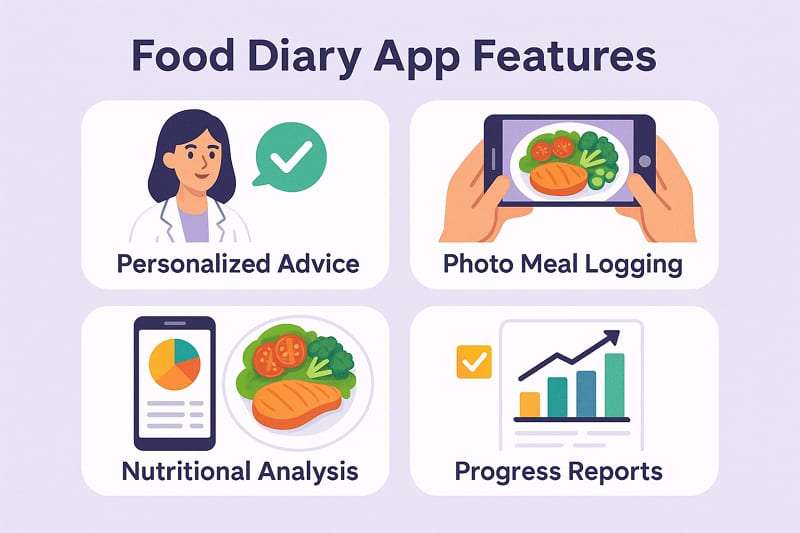
Part 4. 6 Best Food Diary Apps
Many apps help track meals and nutrition, but finding the right food diary app can be challenging. We've narrowed the top 6 food diary options designed to simplify nutrition tracking and progress monitoring.
1. AI Calorie Counter - CalBye (iOS | Android)
This stands as the best food diary app, helping users record meals through real-time photo captures and barcode scanning. CalBye helps users lose weight, build muscle, or eat healthy by keeping them on track with its dedicated services. Unlike other food diary apps, it leverages AI and machine learning models to identify food items without the fatigue of manual logging.
Its database includes all international food items, providing detailed insights to make it available to everyone seeking health guidance. This AI food diary app takes users' age and weight into account to prepare weekly diet plans tailored to their fitness objectives.
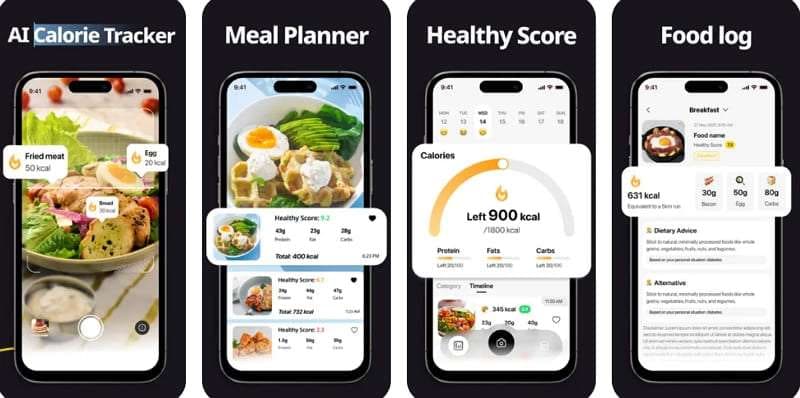
Key Features
- Food Quality Score: Rates all foods out of 100 on their health value to assist users in choosing the most suitable food.
- AI Meal Recognition: It helps users to take pictures and record meals in real-time to calculate relative calories and macros.
- Personalized Recommendations: Offers daily advice about ingredient alternatives and routine changes to reach user-oriented fitness goals.
- Nutritional Insights: Tracks every meal and provides a detailed breakdown of calories coming from protein, carbohydrates, and fats.
- Simple Interface: Tabs are organized in categories and have easy navigation with no advertisements and a user-friendly interface.

2. Cronometer (iOS | Android)
Cronometer is a food diary app that records food, biometrics, and activity, and gives macro and micronutrient analysis based on validated databases. It provides individualized diet, exercise, and health information to make informed health choices. This application enables the integration of devices and a Pro platform to work with clients on a large scale.
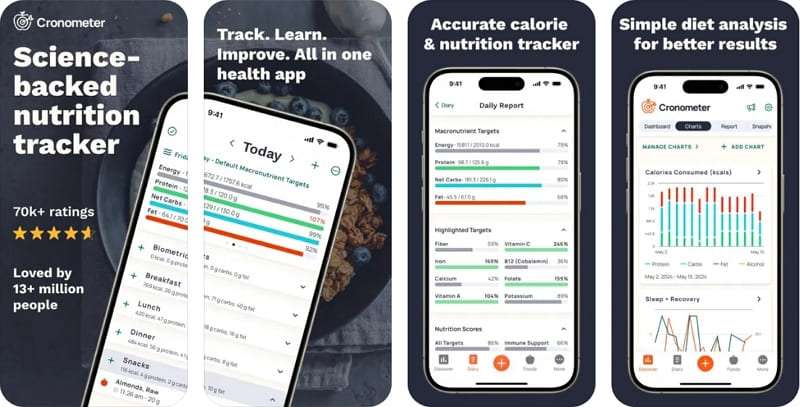
Key Features
- Allows manual change of macronutrient recommendations to focus on a single macro.
- Supports barcode scanning to capture and track macros in packaged goods.
- Offers full customization of macros, food details, and measurement options.
3. Lose It! (iOS | Android)
Counted among the best food diary apps, Lose It! assists in establishing an individual's calorie expenditure, recording meals, and monitoring weight and exercise. This application provides notifications, knowledge, and wearable integrations to facilitate long-term weight control and wellness. Lose It! monitors nutrition and gives a breakdown of macronutrients to help achieve fat loss or weight gain.
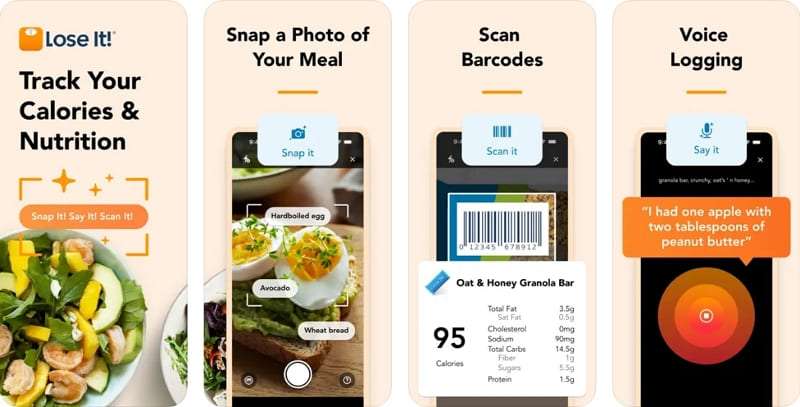
Key Features
- Order food through live photo images and AI voice order through the mic.
- Monitors health information, including blood pressure, body measurements, and sleep patterns.
- Develops an intermittent fasting program and monitors fasts and daily food diaries.

4. MyNetDiary (iOS | Android)
This serves as a food diary app featuring fast logging with barcode and AI Meal Scan, an extensive verified database, and privacy-friendly use. It offers free tools, optional premium diets, and integrations with Apple Health and Apple Watch for tracking and guidance. MyNetDiary features a database of 1.7 million foods covering 107 nutrients.
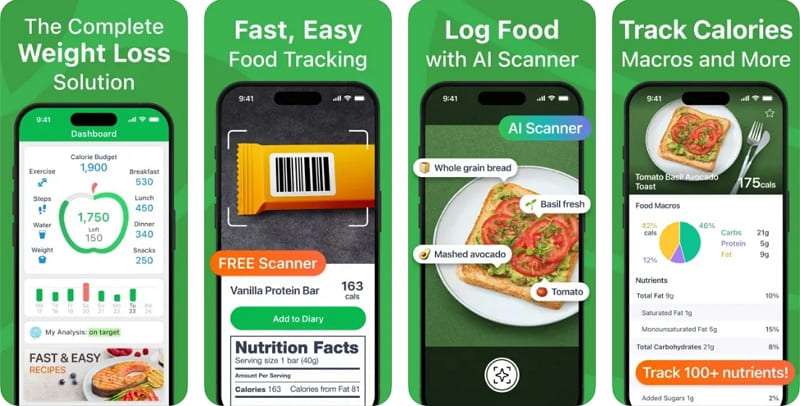
Key Features
- Tracks and reminds water intake daily to help them stay hydrated.
- Allows users to customize foods and edit recipes as per their health goals.
- Syncs directly with Health Connect, Samsung Health, and Google Fit for activity tracking.
5. Lifesum (iOS | Android)
Lifesum is a nutrition application that helps create personalized healthy eating plans and automatically track meals. The food diary app combines photo, voice, text, and barcode recording with diet plans, recipes, hydration tracking, and activity tracking, as well as weekly progress reports.
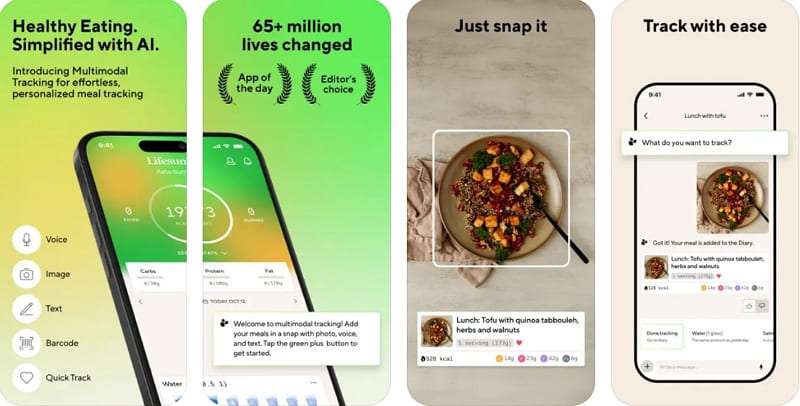
Key Features
- Computes total nutrition and decomposes macronutrition of meals.
- Integrates with fitness tracking devices to monitor health.
- Offers meal plans and a list of groceries required for meal preparation.

6. Yazio (iOS | Android)
This is one of the best free food diary apps used to log meals, estimate portions from photos, plan recipes, and track fasting. It offers a detailed analysis of macronutrients and the benefits of a meal from an extensive food database. Yazio offers meal scanning, notifications, and optional PRO features, including detailed analysis and gadget synchronization to help achieve lasting weight targets.
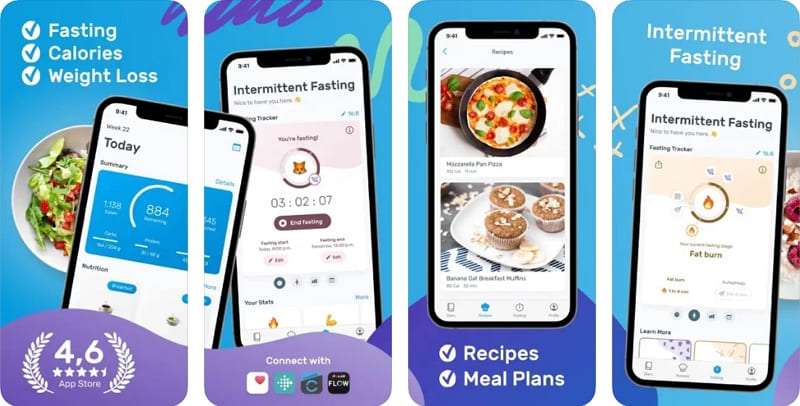
Key Features
- Sends reminders each day to drink water and maintain proper hydration.
- Tracks total steps and activity through integration with fitness trackers.
- Helps users visualize trends, patterns, and progress in eating habits at a glance.
Conclusion
Summing up, having an ideal food diary app can help you track every meal and eat within a specific caloric budget. Thus, in this article, we have narrowed down the top 6 apps for food diaries to help you measure nutrition effectively. However, if you are looking to sign up for any food diary, we recommend using CalBye, which identifies food items with real-time pictures and provides accurate insights.

FAQs
-
Can a food diary app help track multivitamins or supplements?
Yes, many food diary apps let you log multivitamins and supplements. They track nutrient consumption, identify deficiencies, and send alerts for daily supplements. -
How do food diary apps handle homemade meals without preloaded recipes?
The best free food diary app and paid options allow for the manual entry of homemade meals, including ingredients and portion sizes. Some apps also estimate nutritional values based on similar foods or user-generated data for accuracy. -
How do I know which meal is best for my health and fitness goals?
Many apps offer a food quality score to rate their nutritional value. CalBye stands out by giving detailed scores and insights to show which meals best support your goals.


